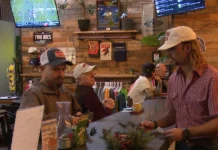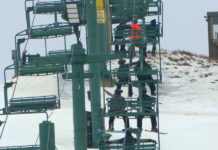Tokyo
CNN
—
Ginzan Onsen, a popular Japanese hot spring town known for its scenic snowy views, has begun limiting entry to day trippers during winter peak season, becoming another destination to tackle overtourism amid the country’s record influx of travelers.
Located in the Yamagata region about 260 miles north of Tokyo, the onsen is one of the most famous in Japan, drawing around 330,000 visitors each year.
Travelers from around the world flock to the 300-year-old town during winter not only for a dip in the onsen but its picturesque scenery of traditional Edo-period buildings blanketed in snow – speculated to be the inspiration for Oscar-winning animator Hayao Miyazaki’s film Spirited Away.
But its popularity has also caused problems for residents in the otherwise tranquil town, with reports of altercations over photo spots and parking places.
“Many guests became angry (were shouting) over good spots for the purpose of taking pictures, leading to traffic rules being broken, cheating, and making people seek better places and easier ways than others,” the onsen said on its website, regretting that its “vague management” had caused issues.
Starting January 7, those wanting to enter the onsen town after 5pm will be required to purchase a ticket, according to Ginzan Onsen Information Center. Visitors without bookings at local hotels will be banned after 8pm.
Tickets, including the bus rides, cost 1150 yen, about $7.
Those driving themselves will be required to park at a nearby tourist center and use shuttle buses to get into the town.
Hiroyuki Ishii, from the Ginzan Onsen Overtourism Measures Project Office, told CNN daytrippers who drove often got stuck in snow-covered roads, causing traffic congestion and blocking ambulance access.
“The area for taking photos is narrow, and sometimes visitors have a dispute with each other telling them to move out of the way. There have been times when people almost fell into the river after bumping into each other,” he added.
Ginzan Onsen is joining a raft of popular tourist destinations to regulate visits as Japan receives a record tourism boom in recent months.
The country already recorded 33 million overseas tourists this year until November, beating the 31.9 million record set by the whole of 2019, according to the Japan National Tourism Organization.
In May, Fujikawaguchiko, a small town at the base of Mount Fuji, had to erect a large black net to block the view of a popular photo spot featuring a convenience store against the famous mountain, after it caused nuisance to residents. The net was removed in August after the craze had subsided.
Other places such as Mount Fuji and Himeji Castle – Japan’s largest castle, located in western Hyogo Prefecture – are proposing to raise entry fees for visitors.


























